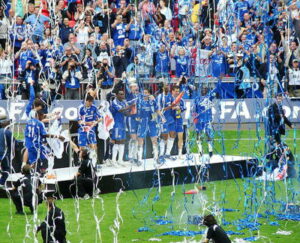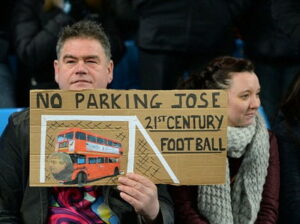 The term ‘parking the bus’ is one that is widely associated with José Mourinho, the former Chelsea and Manchester United manager who is well-known for his defensive tactics. The Portuguese manager made a name for himself when he won the Champions League with Porto in 2004, earning himself a move to Stamford Bridge.
The term ‘parking the bus’ is one that is widely associated with José Mourinho, the former Chelsea and Manchester United manager who is well-known for his defensive tactics. The Portuguese manager made a name for himself when he won the Champions League with Porto in 2004, earning himself a move to Stamford Bridge.
Despite his reputation, it was only during the latter part of his career when ‘parking the bus’ became his go-to strategy.
Mourinho is far from the only manager who has opted for a defence-first tactic on the football pitch, of course. Managers like Sam Allardyce, Tony Pulis and Roy Hodgson were also known for their decisions to set up teams defensively first and foremost.
A ‘do not lose’ mentality was key to their management style, with actively trying to win far from their agenda. The question is, was it ever a fair tactic to adopt and does it actually work?
What Does ‘Parking The Bus’ Mean?
 The idea of parking the bus is a relatively simple one. It is when a manager sets up their team in a defensive manner, putting as many players as possible behind the ball.
The idea of parking the bus is a relatively simple one. It is when a manager sets up their team in a defensive manner, putting as many players as possible behind the ball.
Often only a solitary striker will be left up the pitch, who their teammates will try to hit with long-ball clearances. The idea behind the formation is that it makes the team extremely difficult for the opposition to break down and score against.
Of course, the problem with playing ‘park the bus’ football is that you’re asking your defence to be extremely switched on for the duration of the match.
Though it makes it difficult for the opposition to score, it is equally tricky for the defensive team to score and if they do have a moment of lapsed concentration and concede then turning the mentality around to become attacking in the middle of a match is hard to do.
When It Is Appropriate?
 It would be unfair to say that none of the better teams ever play park the bus football. There are times when it is a suitable way to play, such as when you’re playing the second-leg of a cup game and are defending a lead from the first-leg. Even the most attack-minded teams will look to play counter-attacking football in such a circumstance, playing in a defensive manner first and foremost.
It would be unfair to say that none of the better teams ever play park the bus football. There are times when it is a suitable way to play, such as when you’re playing the second-leg of a cup game and are defending a lead from the first-leg. Even the most attack-minded teams will look to play counter-attacking football in such a circumstance, playing in a defensive manner first and foremost.
There’s also an argument for poorer teams to park the bus when they’re coming up against extremely attacking teams. As mentioned, though, this sets them up to fail if they do concede a goal. As a result, it’s probably more suitable for teams to set up defensively when they’re trying to keep their goals conceded tally low. It is, in essence, an acceptance that they’re not going to win the match, probably not even draw it, but goal difference can be crucial in a relegation battle.
‘Parking the bus’ is also a tactic that can nullify the pace of the opposition. Sometimes teams are built around fast players, but they can only be truly effective when they are able to get in behind the opposition. By asking the defence to sit deep, a manager essentially removes the weapon of speed from an opposition’s arsenal. It is one of the key tactics employed by an underdog team against a side that is expected to win.
Not Losing Rather Than Trying To Win

The first thing to acknowledge about parking the bus as a tactical strategy is that its aim first and foremost is to not lose. Rather than going out to win football matches, sides that are ultra defensive are more interested in hoping that they don’t lose and any success that comes after that is more through luck than judgement.
Some managers might try to argue that they’re setting up to counter-attacking, but few believe this.
Parking the bus football is a style of the game that requires proponents of it to believe that the end justifies the means. Those that dislike it argue that football is supposed to be entertaining.
It is not fun to watch your team defend for the best part of 90 minutes, with possible goals being the luck of circumstance from a corner or a free-kick rather than because of attacking and free-flowing football.
Defences Win League Titles

José Mourinho, of course, would argue that all successful teams are based on a solid defence before all else. Whilst goals are the things that bring a team success, they alone are useless without a solid defence to build from. In the 2013-2014 season, Liverpool scored 101 goals, just one shy of Manchester City, but missed out on the title thanks to 50 goals conceded compared to 37.
The idea that defences win titles is an argument that holds some water, with the following table showing the number of goals conceded by the winning Premier League team compared to the next fewest goals conceded (or the fewest goals conceded if the 2nd placed team conceded fewer), looking at it over a ten year period:
| Season | Goals Conceded By Champions | Next Fewest / Fewest Goals Conceded | Difference |
|---|---|---|---|
| 2021-2022 | 26 | 26 | 0 |
| 2020-2021 | 32 | 36 | -4 |
| 2019-2020 | 33 | 35 | -2 |
| 2018-2019 | 23 | 22 | 1 |
| 2017-2018 | 27 | 28 | -1 |
| 2016-2017 | 33 | 26 | 7 |
| 2015-2016 | 36 | 35 | 1 |
| 2014-2015 | 32 | 33 | -1 |
| 2013-2014 | 37 | 27 | 10 |
| 2012-2013 | 43 | 34 | 9 |
Of the ten seasons looked at, the winners of the Premier League conceded fewer goals than the next best team on just 4 occasions.
On two of the other five occasions they only conceded one more than the next best team, while in the 21/22 season the goals against was even with the next best team, with only one of the campaigns seeing the next best defence conceding double-figures fewer goals than the team that won the championship.
Having the best defence might not be all that important then, but having a good one certainly is.
Goals Conceded In Relegation Battles

Looking at the title winning teams is all well and good, but most of them will be looking to attack the opposition as much as possible and therefore will have well-balanced teams to allow them to do as much. To put it another way, it’s a lot less likely that title-challenging teams will be entirely about parking the bus, whereas the same cannot be said of teams that are fighting relegation.
The question therefore becomes, does a team that faces a possible exit from the league need to look to concede fewer goals than those around them?
In order to investigate this, in the table below we have looked at the goals conceded and goals scored by the team in 18th place at the end of each of our ten seasons, as well as the goals conceded and goals scored by the team that narrowly avoided relegation by finishing 17th each year.
| Season | 18th Place Goals Conceded | 18th Place Goals Scored | 17th Place Goals Conceded | 17th Place Goals Scored |
|---|---|---|---|---|
| 2021-2022 | 53 | 34 | 79 | 42 |
| 2020-2021 | 53 | 27 | 55 | 33 |
| 2019-2020 | 65 | 40 | 67 | 41 |
| 2018-2019 | 69 | 34 | 60 | 35 |
| 2017-2018 | 56 | 28 | 56 | 37 |
| 2016-2017 | 80 | 37 | 68 | 40 |
| 2015-2016 | 65 | 44 | 62 | 48 |
| 2014-2015 | 51 | 33 | 57 | 31 |
| 2013-2014 | 62 | 28 | 59 | 43 |
| 2012-2013 | 73 | 47 | 54 | 41 |
There were only three occasions on which the team that got relegated conceded fewer goals than the side that finished 17th, with one more occasion on which the number of goals conceded were the same. That might suggest that parking the bus in an attempt to concede fewer goals is the best way to remain in the league. Yet that isn’t necessarily what we should take from the information above.
It’s noteworthy that the relegated team only outscored the team that stayed up on three occasions. That is suggestive of the idea that scoring goals is more important than keeping clean sheets, or at least that finding a balance is important to a team’s survival. We don’t know what tactics where opted for by the teams in question, of course, but conceding goals seems less influential than scoring them when it comes to staying in the Premier League.
When It Works
 The simple truth about parking the bus is that it only really works when managers have players available that are excellent at doing it. A team that is likely to be in a relegation battle can try to park the bus, but if the players in the side aren’t very good then it is unlikely to work as a tactic. Eventually the opposition will almost certainly find a way through, with poorer players making a mistake at some point.
The simple truth about parking the bus is that it only really works when managers have players available that are excellent at doing it. A team that is likely to be in a relegation battle can try to park the bus, but if the players in the side aren’t very good then it is unlikely to work as a tactic. Eventually the opposition will almost certainly find a way through, with poorer players making a mistake at some point.
On the other hand, a manager like Diego Simeone spent his career as Atletico Madrid manager ensuring that he had exactly the right players to allow him to pull off his system. It meant that he was constantly able to push better teams like Real Madrid and Barcelona for the La Liga title, as well as progress in the Champions League against objectively better teams. It is not a fun style of football to watch, but it when it works it can be extremely effective.
Until the 2020-2021 season, Sam Allardyce had made a career out of being a ‘saviour’ of teams seemingly destined for relegation. Despite his Bolton team actually playing some exciting football, Allardyce changed his approach to setting up teams later in his career so that he could be brought into a side fighting relegation and tighten them up at the back. He enjoyed repeated success with this way of playing, avoiding relegation time and again.
It is worth noting that he would usually depart the club he’d ‘saved’ not long after, such is the extent to which most football supporters don’t actually want to watch their club play in such a manner. The likes of Sean Dyche at Burnley didn’t come under too much criticism because the supporters appreciated his work getting the club promoted and realised that getting a team to play in such a manner is actuality an art in its own right.
The Practice Is Not Well-Liked
 Parking the bus is not a strategy that is well-liked in football, even if most people accept that it is a necessary evil sometimes.
Parking the bus is not a strategy that is well-liked in football, even if most people accept that it is a necessary evil sometimes.
When Rafael Benitez was the manager of Liverpool Football Club, he referred to their neighbours Everton as a ‘small club’ because they set out to defend rather than play football. It was a comment that would come back and haunt him years later when he took over as manager at Goodison Park.
During the 2016 European Championship, Cristiano Ronaldo criticised Iceland for ‘parking the bus’ in the wake of his Portugal team’s inability to score more than one against the Icelandic team, with the group stage match finishing 1-1.
This is in spite of the fact that Ronaldo had ten of Portugal’s 26 shots, only managing to convert one of them into a goal. His response indicated his frustration at Iceland’s tactical decision making.
Defeating Teams That Park The Bus

When an opposition side decides to park the bus, the team that is trying to defeat them has one real option: move the ball as quickly as possible. Defensively-minded teams want nothing more than to deal with cross after cross flung into the box, allowing them to display their defensive prowess by repeatedly heading the ball away.
What they absolutely do not want to have to do is move around and worry about the opposition side shifting them about the pitch.
You’ll often see teams that are up against a park the bus side passing the ball around their own defensive unit, trying to tempt them up the pitch if they believe that they stand a chance of nicking the ball off them.
They hope they that will be able to disrupt the opposition’s shape, leaving space at the back for them to attack.
It doesn’t always work, but it’s fair to say that being fast of thought and foot is the best way of breaking them down.